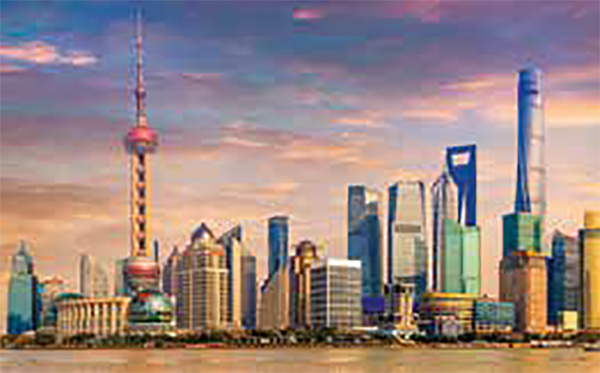The life sciences sector has become increasingly popular given the ongoing global health crisis, putting the spotlight firmly on the need for greater medical care and infrastructure. Implementation of tech solutions to improve existing health infrastructure has also become a trend and one likely to continue as current health and economic challenges due to COVID-19 will see digital health companies playing a more important role in corporate and national growthThe life sciences sector continues to see a multitude of deals involving complex deal structures, from special purpose acquisition companies (SPACs) in the US to public-toprivate transactions. The prolonged impact of the pandemic has varied among different health industries businesses. Those that mitigate the effects of the pandemic with significant excess cash on their balance sheets are likely to have a significant impact on the M&A market for some years to come. R&D and innovation from the region continues to lead to increased licensing deals, partnerships and M&A. We take a look at trends and recent developments in some of the key centres of activity throughout Asia in Greater China, Japan, Korea and Singapore.

The past two years have shone a bright light on the global pharmaceutical industry. Perhaps more so than ever before, the world’s eyes have been watching closely what may come, and of course, the next blockbuster product. From a business perspective, this has, in part, given rise to a range of opportunities in the sector, and among other trends, it has seen an uptick in the level of Mergers & Acquisitions (M&A) activity. Housing one of the world’s largest pharmaceutical companies, Asia is on the world stage for investment; and a combination of global and local developments throughout 2021 seem set to further enhance the opportunities in the sector in 2022 and beyond.
With international appetite growing for special purpose acquisition companies (SPACs) transactions, we saw Singapore and Hong Kong open up their regulatory regimes to listings on their local exchanges, providing a new investment route for pharma companies. From Japan to Singapore, governments in the region made announcements to assert their focus and attention on developments in the sector. We also saw increasing regulatory oversight, particularly in the areas of data privacy and national security, which are likely to be a key factor and consideration for deal activity in the coming months and years too. Let us take a closer look at some of these themes in a little more detail in China, Hong Kong, Singapore, and Japan.
M&A transactions in China’s life sciences market experienced a resurgence in the past year, despite distressing economic, health and social impacts caused by the global pandemic. As such, for 2022 and beyond, we are likely to see a continuation of this with the emergence of a number of trends within China’s life science M&A market.
Investment in China’s life sciences industry will continue to benefit from the nationwide medical reform, the Chinese government’s encouragement and policy support for R&D investment, technology acquisitions, and a trend of enterprising Chinese talent returning in China in recent years. We expect to see vibrant M&A activity in both deal volume and deal value in the market.

China’s biopharmaceutical market is expected to continue to attract interest and investment from global biotech giants, especially from the US. Technological innovations, in particular, novel market segments such as cell and gene therapy (CGT), new drugs and vaccine will remain to be popular acquisition targets.
The pandemic accelerated demand for virtual healthcare in China and has attracted cash-rich tech giants to invest in digital health development such as online health consultation services in recent years. We expect to see more transactions driven by tech giants in the digital transformation of health care.
The trend of increased scrutiny of transactions from competition, foreign investment and data security regulators continued across the globe in 2021. We expect this to continue, and likely accelerate, in 2022. The escalating trade tension between China and the U.S. may impact the outbound transactions, which has been low in the past year as compared to inbound investment.
The more flexible listing requirements in HKEx and SSE’s STAR have contributed to the new highs of biotech IPOs. Driven by this trend, ongoing acceleration of finance investment transactions in China’s life science market is expected to continue.
Despite the pandemic, M&A activity in Hong Kong experienced a healthy jump last year. M&A transactions in Hong Kong tend to involve listed companies, which include mergers with SPACs in the US. The Stock Exchange of Hong Kong Limited (HKSE) introduced its own listing regime for SPACs on 1 January 2022 and many Hong Kong SPACs are now in the making. This will open up opportunities for private companies in the life sciences sector, particularly those based in Asia with a focus on China, to become a de-SPAC target and be given access to public equity.

With the stringent Hong Kong SPACs regime, competition for quality de-SPAC targets is expected to increase, and outbound activities, particularly with targets in the PRC, are expected to be strong. Medical devices and digital health are areas that will likely see continued interest in 2022. HKSE became Asia's largest fundraising venue for the sector, following some major reforms allowing pre-revenue biotech companies to list under Chapter 18A. These companies are eligible for the Stock Connect scheme, giving access to capital flow from the PRC. Private equity appetite in the acquisition of life sciences companies will also likely continue.
No major changes to the legal framework governing M&A transactions are foreseen and Hong Kong continues to have no merger control regime for the sector. The tax regime is expected to remain unchanged after a 30 per cent increase in stamp duty rates for transfer of shares in Hong Kong companies last year, which was the only increase in almost three decades. The Hong Kong Government remains committed to developing biotechnology in the city and to increase collaboration in the Greater Bay Area. Predictability and a favourable policy environment mean Hong Kong is well-positioned to take advantage of the surge in global M&A activities in the sector.
In 2021, the Singapore Government announced its 10-year “Manufacturing 2030” plan, to grow the country’s manufacturing sector and to attract companies at the frontier of manufacturing. Singapore’s vision is to become a global business, innovation and talent hub for advanced manufacturing and the biomedical and other life sciences clusters are key contributors to this vision.
As a competitive life sciences hub in the Asia-Pacific region, Singapore has attracted a high proportion of the world’s largest pharmaceutical firms to set up manufacturing bases and R&D centres. In addition, Singapore has an ecosystem of strong local enterprises that are pioneering developments in the biomedical space. According to the Singapore Manufacturing Federation, the pharmaceuticals industry accounted for 20 per cent of the manufacturing sector which in turn represents about a fifth of Singapore’s gross domestic product in 2019. The Singapore Government aims to make pharma the fourth largest pillar amongst all industries.

In recent years and notwithstanding the pandemic, Singapore has been attracting experienced accelerators and venture capital firms to invest in Singapore (including in local life sciences industry aspirants). According to Enterprise Singapore, the biomedical innovation ecosystem has grown nearly six times over the last decade, with funds raised for the biomedical sector having increased more than five times from about US $86 million in 2016 to US $464 million in 2020.
Similar to a move by Hong Kong and other major global financial centres, 2021 saw the rollout of a regulatory framework to facilitate SPAC listings on the Mainboard of the Singapore Exchange. Given the strong demand across Asia for the Asian-sponsored SPACs that have listed in other exchanges so far, as well as the growing familiarity that the local and regional investor base has with some recent SPACs, this development opens up an exciting new funding avenue for companies in the region, including the pharma sector
With M&A activities within Singapore and the region expected to remain robust coupled with a maturing and rapidly expanding life sciences industry in Singapore, accelerators, venture capital firms, listed companies (including those looking to deSPAC) as well as big pharma companies that are looking for growth targets, we can expect to see an increasing number of opportunities and targets for mergers and acquisitions in the life sciences industry in Singapore, particularly in the biotechnology sector.
In recent years, Japan has taken its place as home to one of the largest pharmaceutical companies in the world. This development resulted from a blockbuster M&A deal and one of the largest deals that the industry has ever seen. It seems likely that Japan’s outbound M&A deal activity to continue to flourish with reports of further outbound acquisitions on the horizon.
Until recently, Japanese life sciences companies had been less active in M&A deals compared to their counterparts in the US and Europe, and most of the M&A activity in the Japanese life sciences industry during the 1990s and 2000s revolved around domestic consolidation and restructuring. The pharmaceutical industry in Japan had been historically dominated by four main players, which controlled multifarious wholesalers and distributors through equity holdings. Following a series of consolidations and restructurings, all around the same time in the early 2000s, the leading pharmaceutical companies in Japan integrated these wholesalers and distributors as part of their own operations.

This internal consolidation was largely driven by the impetus towards globalisation and the need for Japanese companies to scale and build the critical mass necessary to expand business and operations outside of Japan. As a result, major Japanese pharmaceutical companies have been able to steadily gain traction in the global pharmaceutical industry through key acquisitions outside of Japan.
Another trend in the life sciences space in Japan is the entry of non-pharmaceutical companies. For example, the beer maker, Kirin Brewery, established its new pharmaceutical arm, Kirin Pharma, which then merged with Kyowa Hakko Kogyo in 2008 to become Kyowa Hakko Kirin following the merger. In 2011, Kyowa Hakko Kirin acquired ProStrakan Group Plc in Scotland, which subsequently became Kyowa Kirin International PLC to enhance Kyowa Hakko Kirin’s brand in Europe and the
U.S. Other food and beverage companies have also entered the pharmaceutical industry, and it is expected that there will be increased competition in Japan in the life sciences industry with new market entrants.
Today, life sciences companies in Japan are poised to take on the world and further extend their reach beyond Japan through M&A and related transactions. These companies not only include pharmaceutical companies but also medical technology (MedTech) and diagnostic companies. Japan is known as a “super ageing” society with a high number of retirees and elderly who need medical attention. Accordingly, we expect both outbound and inbound M&A, licensing and strategic collaborations involving Japanese companies in the life sciences industry.
In September 2021, Japan’s Ministry of Health, Labor and Welfare (MHLW) announced its “vision” for Japan’s pharmaceutical industry and highlighted, inter alia, digital transformation of the healthcare industry (including use of artificial intelligence), generic drugs, domestic sales of biopharmaceuticals and biosimilars, and new drug development, including anti-cancer drugs, through acquisition of and partnerships with foreign companies as vital growth areas. We expect to see an uptick in M&A and other strategic transactions in these areas.
Following the events of the past two years the M&A outlook across China, Hong Kong, Singapore and Japan has been buoyant and currently shows no signs of slowing down. As governments seek to remain regionally and globally competitive in this flourishing sector, we are likely to see a continued focus on ensuring they remain attractive to investors.
Referance: Japan Ministry of Welfare and Labor, Pharmaceutical Industry Vision 2021; available at https://www.mhlw.go.jp/content/10800000/000831973.pdf